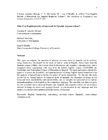Can English provide a framework for Spanish response tokens? (Pre-published version)
Citation
Amador Moreno, C. P., McCarthy, M. J. and O’Keeffe, A. (2013) “Can English Provide a Framework for Spanish Response Tokens?” The Yearbook of Pragmatics and Corpus Linguistics, 1(1):175-201.

View/
Date
2013Author
O'Keeffe, Anne
Amador-Moreno, Carolina P.
McCarthy, Michael
Peer Reviewed
YesMetadata
Show full item record
Amador Moreno, C. P., McCarthy, M. J. and O’Keeffe, A. (2013) “Can English Provide a Framework for Spanish Response Tokens?” The Yearbook of Pragmatics and Corpus Linguistics, 1(1):175-201.
Abstract
This paper investigates the question of whether response items in Spanish can be analysed using frameworks developed for the study of similar items in English. Data comes from the Spanish corpus COREC, the Corpus Oral de Referencia del Español Contemporáneo, and is compared where appropriate with data from the British English corpus, CANCODE, the Cambridge and Nottingham Corpus of Discourse in English. The main motivation behind this paper is to assess the possibility and appropriateness of using English-based frameworks for the analysis of Spanish and to further the notion of ‘good listenership’. To this end, the study scopes out (a) formal aspects of response items in Spanish, (b) pragmatic coverage of the items and their translatability and transferability, and (c) insights into potential cross-cultural misunderstandings with English as the comparison language. We conclude that there is a good but not complete match between English and Spanish, that response tokens are an essential element in being an active and engaged listener in conversation in any language and that fluency is a process best understood in the context of dialogue.
Keywords
EnglishListenership
Turn-taking
Response tokens (Spanish)
Cross-cultural communication

